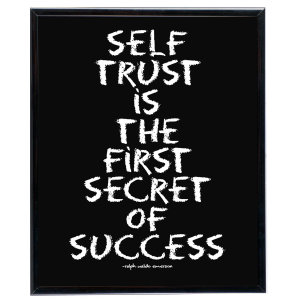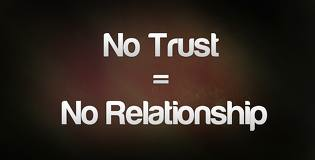
I sat in her office and listened to her story. She was a seasoned MGO who, over the last four years had, in mostly subtle ways, been talked down to, made small and “put in her place.” It had stolen her spirit. And she had lost the brilliant spark and drive she once had. She had lost self-trust.
It was sad to see.
At one point she broke down and cried. She said, “You know, Richard, I’m not the same person I was before. I used to be confident. I used to trust my instincts and abilities. And now I am unsure and anxious. I am filled with fear. And I’m not happy.”
I was angry.
I was angry about the system and people who had torn this good woman down. And the conversation reminded me of my own painful journey of building self-confidence and trust – a journey that took me to many places over decades of work.
And here’s the interesting thing and the reason I am writing about this topic. If you don’t in some measure have your stuff together, it will be very difficult to relate to a donor and build trust. I hadn’t thought about this quite in this way until I read Stephen Covey’s book on trust.
There is an unavoidable link here that you must pay attention to if you are to be successful in building trust with donors. Now, don’t worry, we’re not going into a therapy session here. But I do want to explore this a bit so you can see the connections that have come clear to me on this subject.
Jeff and I have talked quite a bit about the special relationship the organization and the MGO have with a donor. The whole major gift effort is primarily about walking with that donor to assist in the fulfillment of his or her interests and passions through giving. It is a relationship built on trust.
- Trust that you are telling the donor the truth.
- Trust that you have the donor’s best interests at heart.
- Trust that you really do care about the donor, not just her money.
- Trust that the money will be used as you have said it would.
- Trust that after you get the money you will still talk to the donor with the same level of attention and warmth as before you did you got it.
But if you, as an MGO, are living in a place of fear and lack of confidence, how can you possibly build trust with a donor? You can’t – at least not to the degree you should – because fear and self-doubt have a way of turning things around. And that’s why this whole building trust thing starts with you.
As I’ve gotten older – I’m 65 now – I’ve realized how horribly lost I was on this topic. I’m still not out of the woods, but I am getting there. I now understand that I can be really good at something, but if the other person doesn’t trust me, the whole thing doesn’t work. So now I focus on being good at the things I am good at AND behaving in a trustworthy manner. Both of these efforts matter.
In the major gifts field, you can be an amazing MGO but operate with an “ends justifies the means” mentality and not be very successful. That is why you have to start with yourself when it comes to the topic of trust. But how does it work and where do you start?
As Stephen Covey states in his book, the development of self-trust goes along the following path:
- It starts with integrity – being a person that is authentic, congruent and self-aware.
- It moves to intent where your motives contain genuine concern for people, purposes and society; where your agenda is to seek mutual benefit, not just yours, and; where your behavior integrates motive and agenda in how you actually behave.
So, to get started on this journey of building self-trust, I would ask you, just as I ask myself, and Jeff and I ask each other: “Who are you as relates integrity and intent?” When you are dealing with donors, who are you? Are you the person that operates with authenticity with the donor? Is it your intent to uncover mutual benefit that is driven by a concern for the donor?
Check this out. And if you’re like Jeff and me, there will be some work to do.
Now, if you are experiencing anything like the MGO I talked about at the beginning of this blog, where you have lost trust in yourself, your capabilities or your contribution – get out of that destructive place as soon as you can, so you can get back to a place of wholeness and possibility. And find a friend, colleague or professional who can walk with you.
This major gift work is way too hard to navigate with the extra burden of negative, destructive and abusive managers and cultures. And, as I have pointed out in these writings, those kinds of places upset the delicate emotional and psychological eco-system necessary to secure success with donors. So, get out of there, for yourself and your donors. It will be good for you.
And if your culture is a healthy and supportive place, it is always good to be aware of the connection between self-trust and your relationship to your good donors. Keep thinking about this so you can be the person you need to be for yourself and for them.
Richard







This is excellent and so true.
This is an informative series, thank you! For some reason it is difficult for me to communicate to my potential donors so reading this gave me some good thoughts. I do appreciate Stephen Covey.